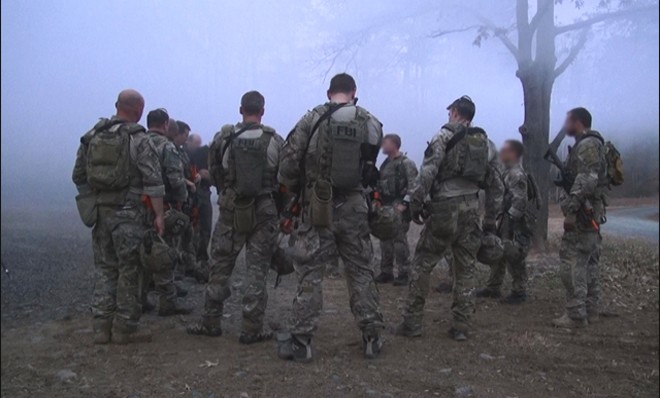Meet the FBI hostage team that rescued Hannah Anderson
Think of them as a sort of domestic SEAL Team Six

A free daily email with the biggest news stories of the day – and the best features from TheWeek.com
You are now subscribed
Your newsletter sign-up was successful
In February, one of the nation's most elite units breached a heavily fortified bunker using specially designed explosives, disoriented the adversary with "flashbang" stun grenades, and then, in the face of hostile fire, killed him with surgical precision. The lightning raid resulted in the successful rescue of a hostage.
Two months later, the same unit was tasked with another harrowing assignment. This time it captured one of the world's most wanted terrorists following a sprawling and fast-moving manhunt.
Then, just a few weeks ago, the unit came up big in another successful hostage rescue operation, when, after being ferried into a treacherous, mountainous region by Blackhawk helicopter, these men traveled for miles on foot across challenging terrain to track down a hostage taker and his victim. After being shot at, they returned fire with deadly accuracy, freeing the hostage unharmed.
The Week
Escape your echo chamber. Get the facts behind the news, plus analysis from multiple perspectives.

Sign up for The Week's Free Newsletters
From our morning news briefing to a weekly Good News Newsletter, get the best of The Week delivered directly to your inbox.
From our morning news briefing to a weekly Good News Newsletter, get the best of The Week delivered directly to your inbox.
These are not a list of classified operations conducted by SEAL Team Six in Afghanistan. They are, respectively, the rescue of 5-year-old Ethan in the Alabama school bus kidnapping, the arrest of Boston bombing suspect Dzhokhar Tsarnaev in Massachusetts, and this month's freeing of Hannah Anderson in Idaho.
And despite being decked out in MultiCam camouflage and armed with HK416 assault rifles, the operators described are not U.S. Navy SEALs. Instead, they are American civilians operating on American soil, squaring off against fellow American civilians while saving innocent American lives.
Meet the FBI Hostage Rescue Team.
The FBI Hostage Rescue Team is effectively the civilian equivalent of the Joint Special Operations Command's famed yet mysterious counterterrorist organizations — the Naval Special Warfare Development Group (more popularly known as "SEAL Team Six") and the Army's 1st Special Forces Operational Detachment-Delta (Delta Force). As such, the FBI Hostage Rescue Team is essentially one of the United States' three national-level "Tier 1" CT assets. These units utilize common techniques, technology, and training methods, and frequently train and operate alongside one another.
A free daily email with the biggest news stories of the day – and the best features from TheWeek.com
While Delta Force and SEAL Team Six have been busy chasing terrorists the world over, the FBI Hostage Rescue Team has been quietly active during the "War on Terror" as well, taking part in numerous operations overseas, including frantic gunfights in Iraq as well as the arrest of pirate leader Mohammad Saaili Shibin in Somalia.
However, with a building backlash against the United States government for directing tools supposedly designed to stop terrorist networks overseas on its own citizens — most notably in the developing NSA revelations — the public might be similarly wary of the FBI's high-speed, low-drag outfit. Or at least they might if they were more aware of the existence of a unit with SEAL Team Six-level training that commonly operates domestically.
In fact, such questions were raised two decades ago when the Hostage Rescue Team was widely vilified with accusations of heavy-handed tactics at Ruby Ridge in Idaho and Waco, Texas.
But the unit's recent high-profile successes also illustrate the remarkable effectiveness these capabilities can have at home if wielded carefully and appropriately. It's perhaps notable that the Hostage Rescue Team was cheered in the streets of Watertown after arresting Tsarnaev 20 years to the day after its highly controversial raid of the Branch Davidian compound in Waco.
However, for all their similarities, there are some key differences that distinguish the FBI Hostage Rescue Team from its military counterparts. As Louis J. Freeh, former director of the FBI once stated, "The members of the HRT are not commandos."
While they utilize the same sorts of intense Close Quarters Battle techniques, weaponry, and other tricks of the trade, every member of the Hostage Rescue Team must first serve as an FBI special agent before being allowed to take part in the unit's grueling assessment and selection process. And even after being accepted as a full-fledged assaulter or sniper, they are still considered special agents and subjected to much stricter rules of engagement than those who serve in military counterterrorism units operating overseas. Every round fired by the FBI Hostage Rescue Team must be accounted for and justifiable in a court of law.
The unit's motto is "Servare Vitas" — Latin for "To Save Lives." And recent events seem to present a compelling argument that the types of skills SEAL Team Six and Delta Force rely on to crush terrorist networks are equally useful — at least in the most extreme cases — to save lives at home.
Chris Martin has covered the motorsports world since the late 90s. He's also the author of Shaping the World from the Shadows: The (Open) Secret History of Delta Force, Post-9/11 and Beyond Neptune Spear: The (Open) Secret History of SEAL Team Six, Post-9/11.